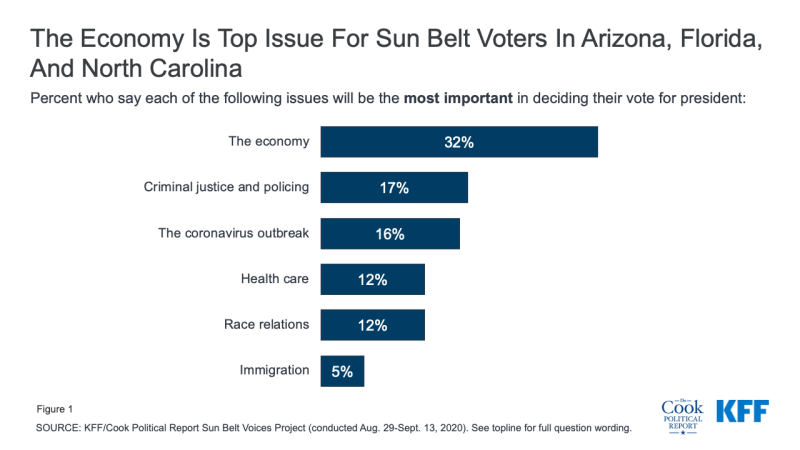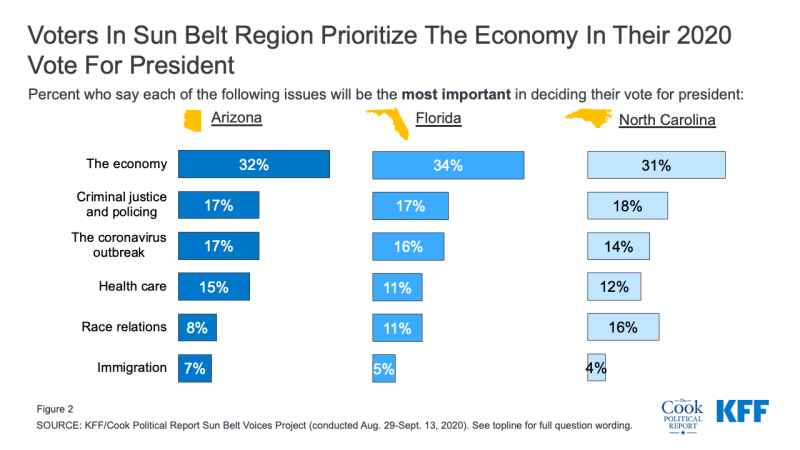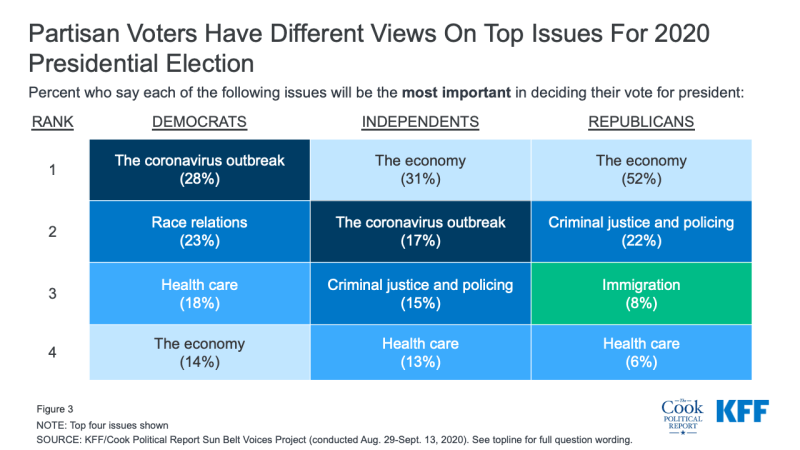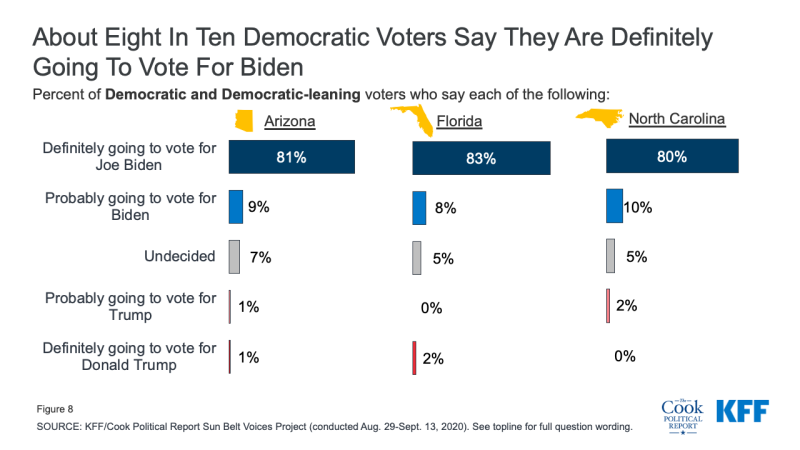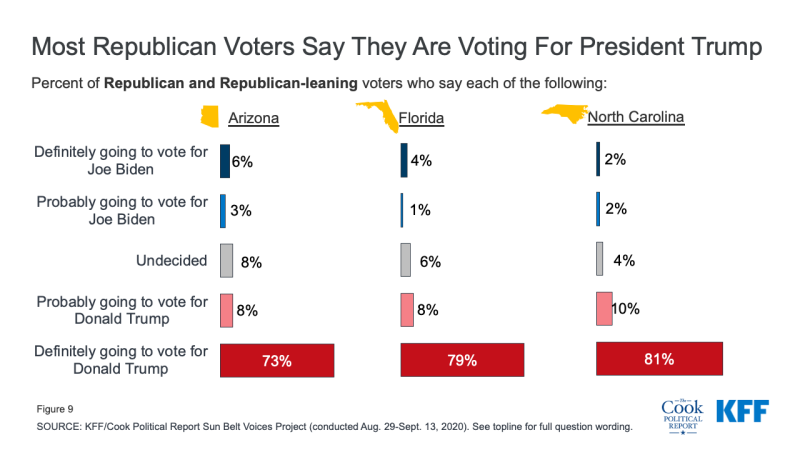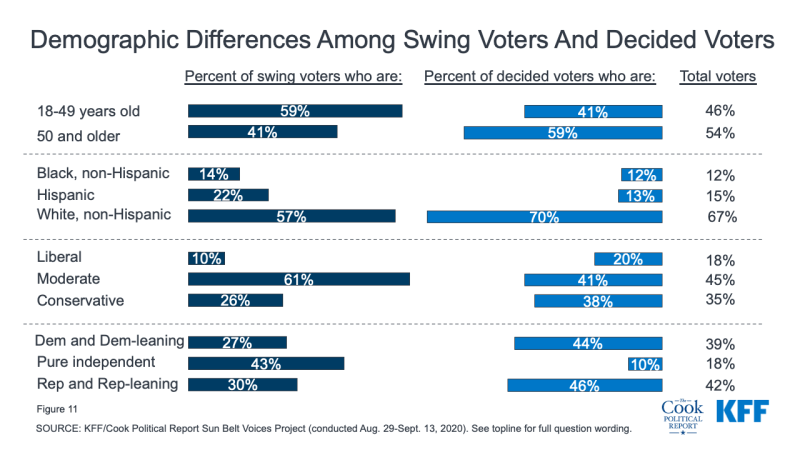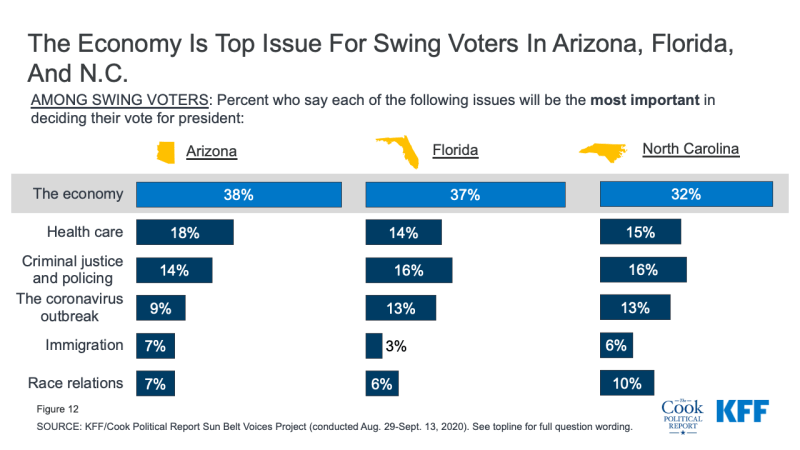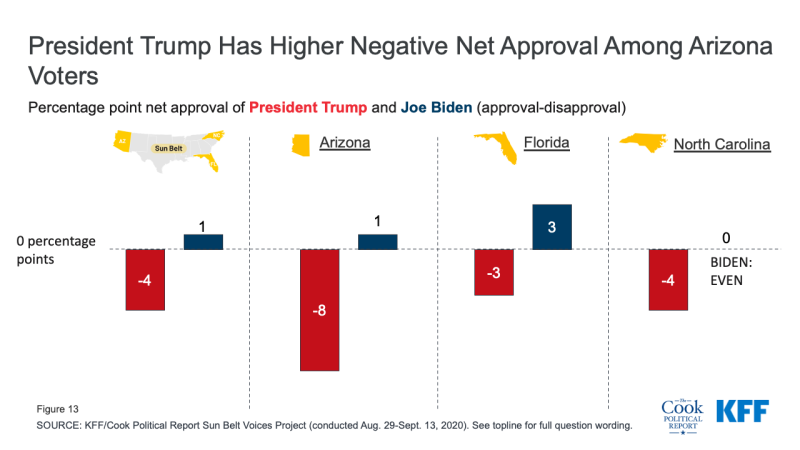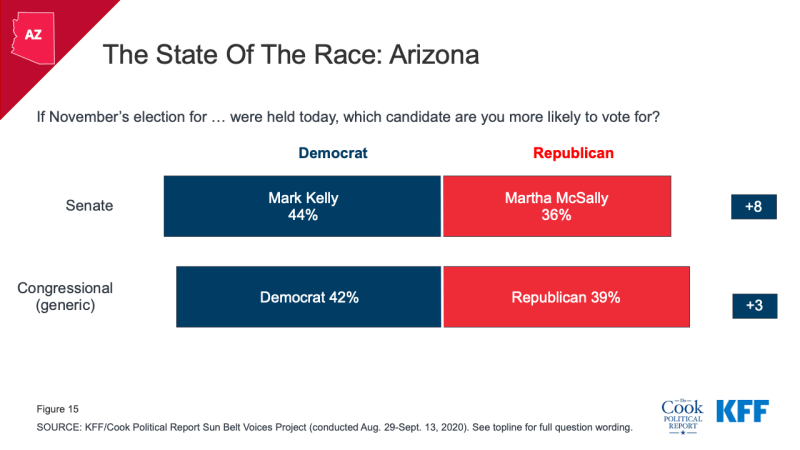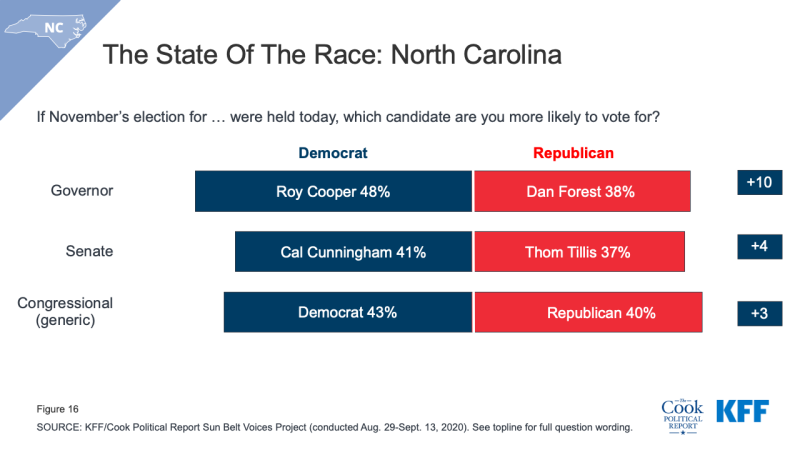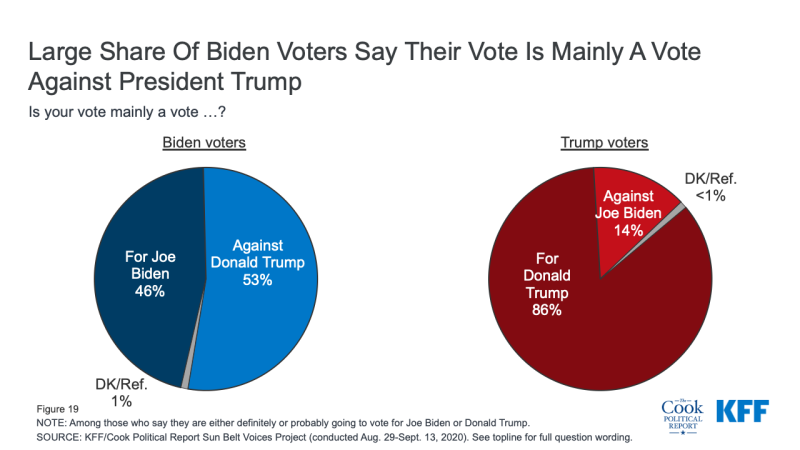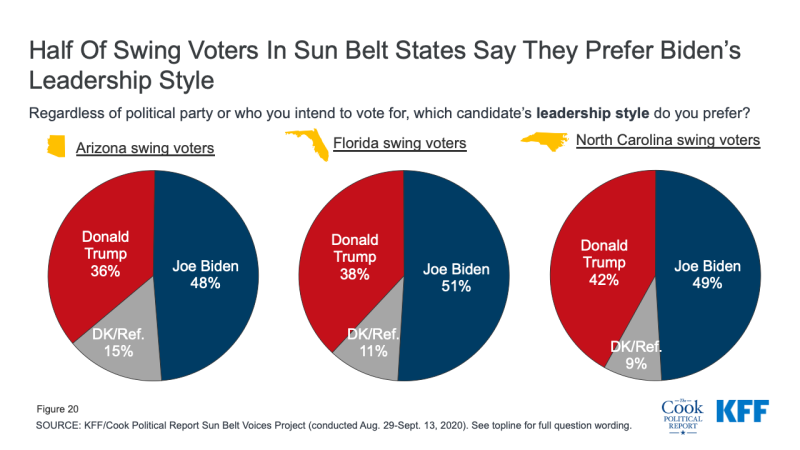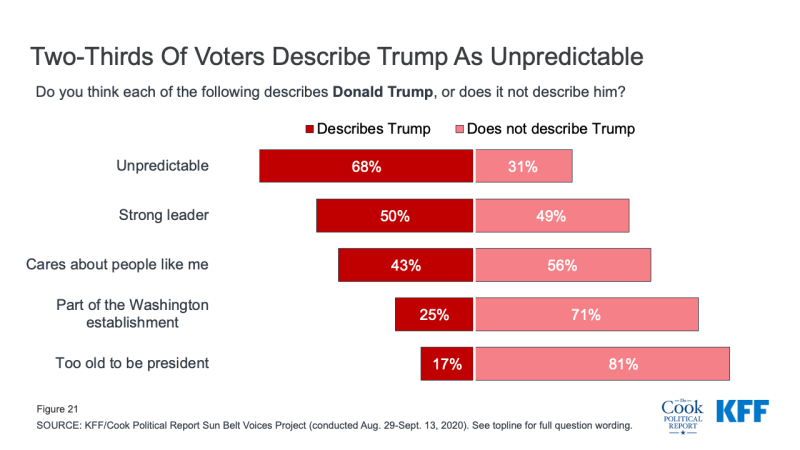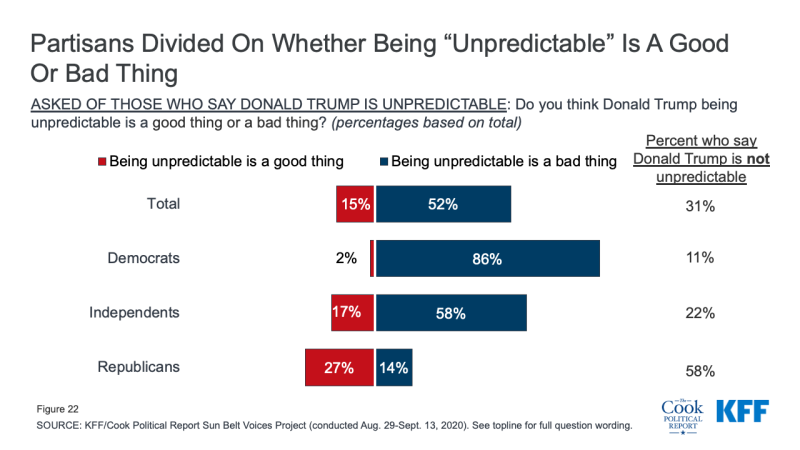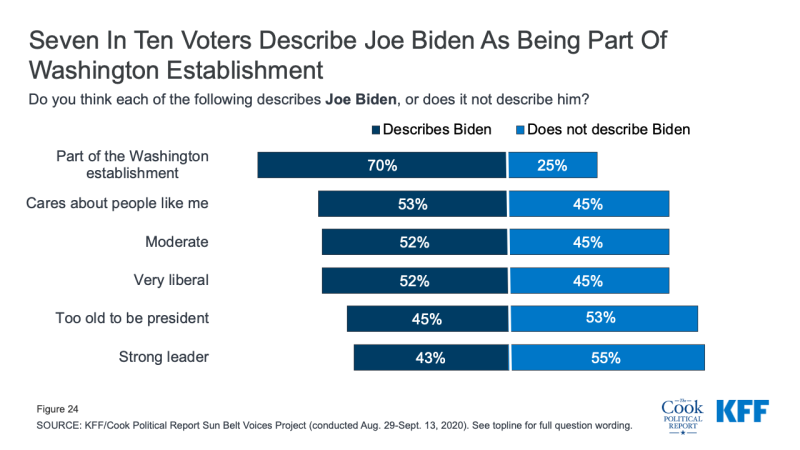Sun Belt Voices Project
Throughout the 2020 election, the Kaiser Family Foundation and Cook Political Report have collaborated on a series of projects examining the attitudes and experiences of voters in several key battleground states leading up the 2020 presidential election. In November 2019, we released the Blue Wall Voices Project, a survey of 3,222 voters in the four states constituting the “Democratic Blue Wall” – the area in the Upper Midwest that was previously considered a Democratic stronghold. The Sun Belt Voices Project is our newest collaboration and includes 3,479 interviews with voters in Arizona, Florida, and North Carolina – three states in which shifting population characteristics may give Democrats an advantage in the more traditionally Republican region of the U.S. Using an innovative probability-based approach of contacting registered voters and allowing poll respondents to participate online or over the telephone, KFF and The Cook Political Report interviewed 1,298 voters in Arizona, 1,009 voters in Florida, and 1,172 voters in North Carolina from August 29 to September 13, 2020. For more details, please see the methodology section of this report.
Sun Belt Voices Project
A Collaboration Between KFF and The Cook Political Report
Key Findings
- Most voters have made up their minds about how they will vote for president, with results suggesting very close elections in each of the three Sun Belt states included in this project. With most voters in Arizona, Florida, and North Carolina reporting they have already made up their minds about which presidential candidate they plan to vote for in November, the poll, fielded August 29-September 13, finds former Vice President Joe Biden with a slight lead in Arizona (Trump: 40%, Biden: 45%), and the results in Florida and North Carolina within the margin of sampling error; Florida (Trump: 42%, Biden: 43%), North Carolina (Trump: 43%, Biden: 45%).
- About one in five voters are “swing voters” but that doesn’t mean all of these votes are up for grabs. In all three states, nearly one-fourth of voters are swing voters. This includes about one in ten voters who say they are truly “undecided” and a similar share of voters who say they are “probably” going to vote for one candidate, but haven’t definitively made up their minds. Few of those who say they are “probably” going to vote for one candidate say there is a “chance” they would vote for the other candidate, suggesting that some of these “swing” voters just may not vote on election day.
- Swing voters are younger, have more moderate views, and a larger share are Hispanic voters, and also give Biden higher approval ratings than Trump. The crucial group of voters who have not yet decided who they plan to vote for in the 2020 election are younger, and larger shares identify as political moderates and independents. In addition, a larger share of swing voters than decided voters are Hispanic voters. They are also more likely to approve of former Vice President Biden than President Trump.
- Half of swing voters prefer Biden’s leadership style but less than half see either candidate as a “strong leader.” Half of swing voters say, regardless of who they plan to vote for, they prefer Biden’s leadership style over President Trump’s (39% say they prefer Trump’s leadership style). Yet, less than half of swing voters say strong leader describes either President Trump (46%) or Joe Biden (39%). In addition, nearly two-thirds (64%) of swing voters say President Trump is unpredictable and this is a bad thing including a majority of swing voters in Arizona, Florida, and North Carolina.
- President Trump is a motivating force for both Trump voters and Biden voters. Large majorities of voters who say they are going to vote for President Trump (either “definitely” or “probably”) say their vote is mainly a vote for Trump rather than a vote against Biden (86% v. 14%). On the other hand, more than half of Biden voters (53%) say their vote is mainly a vote against President Trump rather than a vote for Biden.
- Trump voters report higher levels of enthusiasm than Biden voters. President Trump’s voters have the enthusiasm advantage in each of the three Sun Belt states included in this poll with about three-fourths of Trump voters in Arizona (73%), Florida (74%), and North Carolina (75%) saying they are “very enthusiastic” to vote for him. Comparatively, about six in ten Biden voters in each of these states say the same (Arizona: 53%, Florida: 60%, N.C.: 57%).
- The 2020 election is about different issues, depending on voters’ party identification. Similar to national poll results, the economy is the top presidential election issue for Republican Sun Belt voters, while Democratic voters are prioritizing the coronavirus outbreak and race relations. On most issues, a larger share of voters trust Joe Biden to do a better job than President Trump. However, on the economy – voters’ top issue overall – more voters trust Trump than Biden (54% compared to 44%).
Top Issues for Sun Belt Voters
One-third of voters (32%) in Arizona, Florida, and North Carolina, three key states in the West and South’s Sun Belt region, say the economy is going to be the most important issue in their 2020 vote choice. This is followed by, criminal justice and policing (17%), the coronavirus outbreak (16%) health care (12%), and race relations (12%). Few voters (5%) say immigration is their top issue. This is also consistent with a recent shift in national polling in which the economy and the coronavirus outbreak, a public health issue, has displaced health care more generally as the top issue for voters.
The economy is the top issue among voters in Arizona (32%), Florida (34%), and North Carolina (31%), followed by criminal justice and policing and the coronavirus outbreak, with both of these two issues ranking similarly among Arizona, Florida, and North Carolina voters.
Partisan voters have very different priorities for the 2020 election when it comes to the top issues driving their votes. Overall, half of Republican voters in these 3 states (52%) say the economy is the most important issue in their 2020 vote choice, more than twice as many as say any other issue. One in five (22%) choose criminal justice and policing, an issue touted often by President Trump, as the most important issue. Democrats, on the other hand, are prioritizing the coronavirus outbreak in their 2020 vote choice with nearly three in ten saying it is the most important issue (28%), followed by race relations (23%) health care (18%), and the economy (14%). Three in ten independents (31%) say the economy is the most important issue followed by the coronavirus outbreak (17%).
This partisan divide on the key issues in the 2020 election is consistent across each of the three states examined in this poll with large shares of Republican voters in Arizona, Florida, and N.C. saying the economy is the most important issue while Democratic voters in Arizona and Florida chose the coronavirus outbreak as their top issue. N.C. Democratic voters were divided between the coronavirus outbreak and race relations as their top issues. Few Republican voters in any of the three states chose either the coronavirus outbreak or race relations as their top issue. About three in ten independent voters chose the economy as their top issue.
| Table 1: Partisans Across Key Sun Belt States Are Divided On Most Important Issue For 2020 | |||||
| Percent of voters who say each issue will be the most important in deciding their vote for president: | The economy | The coronavirus outbreak | Criminal justice and policing | Race relations | |
| Democratic voters | AZ | 15% | 30% | 7% | 18% |
| FL | 14 | 31 | 13 | 22 | |
| NC | 15 | 22 | 15 | 27 | |
| Independent voters | AZ | 31 | 20 | 16 | 8 |
| FL | 32 | 17 | 16 | 8 | |
| NC | 30 | 16 | 13 | 14 | |
| Republican voters | AZ | 47 | 7 | 26 | <1% |
| FL | 54 | 4 | 20 | 3 | |
| NC | 50 | 4 | 24 | 3 | |
With the economy topping the issues for voters heading into the 2020 election, the Sun Belt Voices Project finds that this is the one issue on which President Trump has a trust advantage over Joe Biden. Slightly more than half (54%) of voters in the Sun Belt states say they trust Donald Trump to do a better job dealing with the economy compared to 44% who say they trust Joe Biden. Joe Biden, on the other hand, has the advantage on other key issues such as health care, race relations, and the coronavirus outbreak. Voters were split between the two candidates on who they trust to do a better job handling immigration and criminal justice and policing.
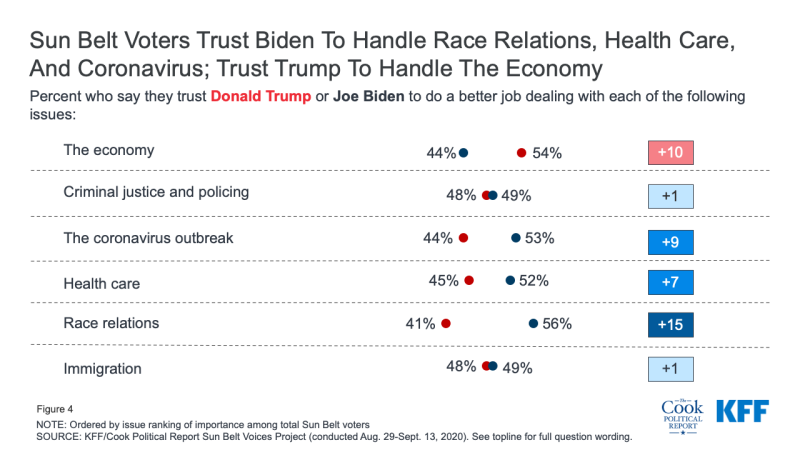
Figure 4: Sun Belt Voters Trust Biden To Handle Race Relations, Health Care, And Coronavirus; Trust Trump To Handle The Economy
Once again, this is consistent across all three states with only one variation; President Trump has the advantage when it comes to the economy while Biden holds an advantage on health care, race relations, and the coronavirus outbreak. On immigration and criminal justice and policing, voters are more divided on which candidate they think will do a better job.
| Table 2: Who Do Voters Trust To Handle Key Issues? | |||
| Percent of voters who say they trust… will do a better job dealing with each of the following issues: | Arizona | Florida | North Carolina |
| Race relations | |||
| Trump | 40% | 41% | 42% |
| Biden | 57 | 56 | 55 |
| Biden +17 | Biden +15 | Biden +13 | |
| The coronavirus outbreak | |||
| Trump | 43 | 45 | 43 |
| Biden | 54 | 52 | 54 |
| Biden +11 | Biden +7 | Biden +11 | |
| Health care | |||
| Trump | 44 | 45 | 45 |
| Biden | 53 | 52 | 53 |
| Biden +9 | Biden +7 | Biden +8 | |
| Criminal justice and policing | |||
| Trump | 47 | 49 | 48 |
| Biden | 50 | 48 | 50 |
| Biden +3 | Trump +1 | Biden +2 | |
| Immigration | |||
| Trump | 47 | 48 | 49 |
| Biden | 51 | 49 | 49 |
| Biden +4 | Biden +1 | — | |
| The economy | |||
| Trump | 52 | 55 | 53 |
| Biden | 45 | 43 | 45 |
| Trump +7 | Trump +12 | Trump +8 | |
The Current State Of Races In Key Sun Belt States
President Trump and former Vice President Biden have slightly fewer than four in ten voters in each of the three states saying they are “definitely” going to vote for them. Thirty-eight percent of Arizona voters as well as 37% of Florida voters and 39% of N.C voters say they are “definitely going to vote for Joe Biden.” This is similar to the share of voters who say they are “definitely going to vote for President Trump” in Arizona (35%), Florida (37%), and North Carolina (37%). One in ten voters say they are “probably going to vote for President Trump” (AZ: 5%; FL: 5%; N.C: 6%), or “probably going to vote for Joe Biden” (AZ: 7%; FL: 6%; N.C: 6%); while another one in ten say they are undecided (AZ: 11%; FL: 11%; N.C: 9%),
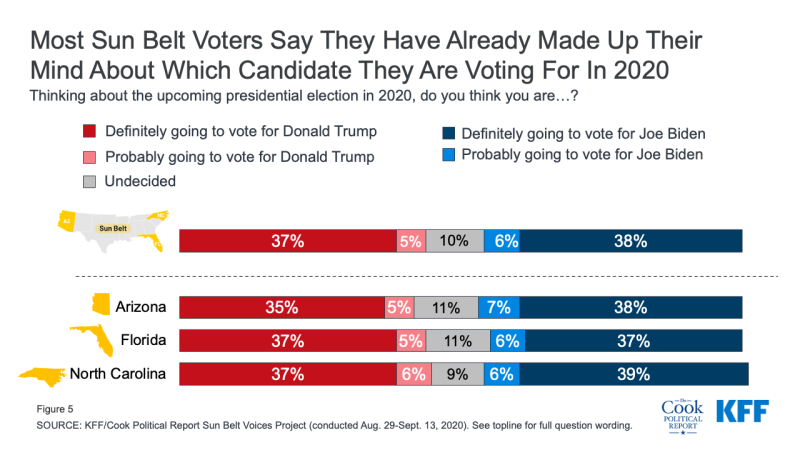
Figure 5: Most Sun Belt Voters Say They Have Already Made Up Their Mind About Which Candidate They Are Voting For In 2020
Putting together “definitely” and “probably” groups, these results indicate that, with less than two months before the 2020 November election, the presidential race in each of these three Sun Belt states is very close with Biden having a slight edge in Arizona (Trump: 40%, Biden: 45%), and within the margin of sampling error in Florida (Trump: 42%, Biden: 43%) and North Carolina (Trump: 43%, Biden: 45%).
Overwhelmingly, President Trump and Vice President Joe Biden are garnering support from their key “bases,” the groups that tend to support one party’s candidate over another and are predicted to vote in favor of the candidate. President Trump has majority support among conservative voters, rural voters, as well as white voters with lower levels of education. In addition, nine in ten (89%) voters who voted for him in 2016 say they plan to vote for him in 2020 while 5% of these voters say they are going to vote for Biden and 5% are still undecided.
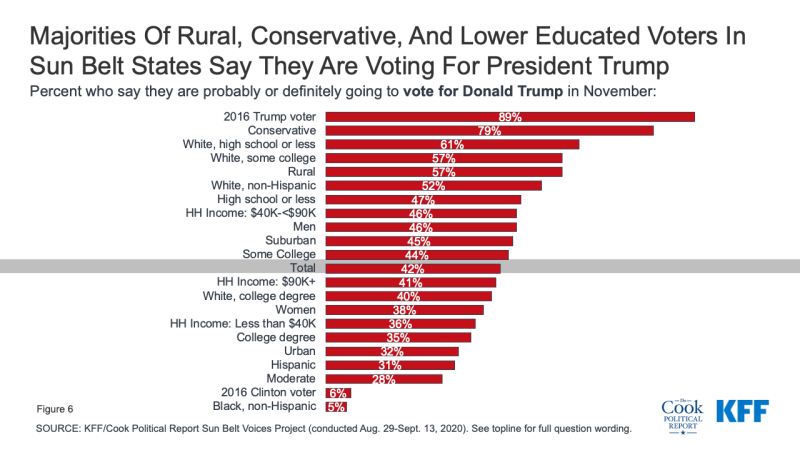
Figure 6: Majorities Of Rural, Conservative, And Lower Educated Voters In Sun Belt States Say They Are Voting For President Trump
Biden, on the other hand, garners majority support from black voters, liberal voters, voters who voted for Secretary Clinton in 2016. More than half of moderate voters (56%) also say they are going to vote for Biden in November.
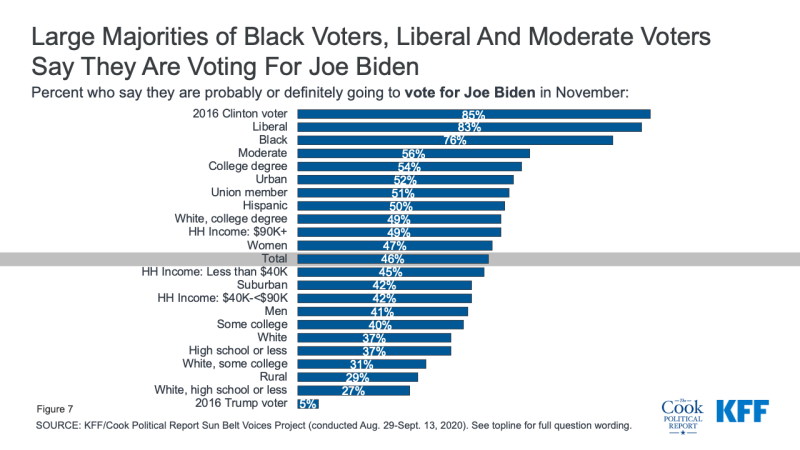
Figure 7: Large Majorities of Black Voters, Liberal And Moderate Voters Say They Are Voting For Joe Biden
Who Are the Decided Voters and Swing voters?
Three-fourths of voters in Arizona, Florida, and North Carolina say they have already made up their minds about which candidate they plan to vote for in the 2020 presidential election and the results indicate a very close election in these states. A majority of Democratic voters and Republican voters in each state say they aren’t going to cast a vote for the other party’s candidate. About eight in ten Democratic and Democratic-leaning independent voters in Arizona (81%), Florida (83%) and North Carolina (80%) say they are definitely going to vote for Joe Biden.
Similar shares of Republican and Republican-leaning voters say they are “definitely going to vote for President Trump” including three-fourths of Arizona (73%), and eight in ten voters in Florida (79%), and N.C. (81%). There is a small but noticeable share of Republican and Republican-leaning voters who say they are “definitely” going to vote for Joe Biden, including 6% in Arizona.
Nearly one-fourth of voters in each of the three states are “swing voters,” a crucial group of voters who have not yet made up their minds about which candidate they plan to vote for. There are not significant differences on the share of voters who are “swing voters” across these Sun Belt states, with similar shares of voters in Arizona (23%), Florida (22%), and North Carolina (21%) saying they are either “probably” going to vote for a candidate or are “undecided.” This is also consistent with our national KFF Health Tracking Poll data which also finds about one-fourth of voters are “swing voters.”
It is important to note that not all “swing voters” could potentially change their vote to support the other party’s candidate. One-third of those who say they are probably going to vote for President Trump say there is “a chance” they will vote for Joe Biden (2% of all voters) and one-fifth of those who say they are probably going to vote for Joe Biden say there is “a chance” they are going to vote for President Trump (1% of all voters); most “probably” voters, on the other side of the ballot, say there is “no chance” they will vote for the other party’s candidate (67% of voters probably voting for President Trump or 4% overall, 80% of voters probably voting for Joe Biden or 5% overall). This is similar across Arizona, Florida, and North Carolina with few voters saying they are “probably” going to vote for one candidate but there is “a chance” they would vote for the other candidate.
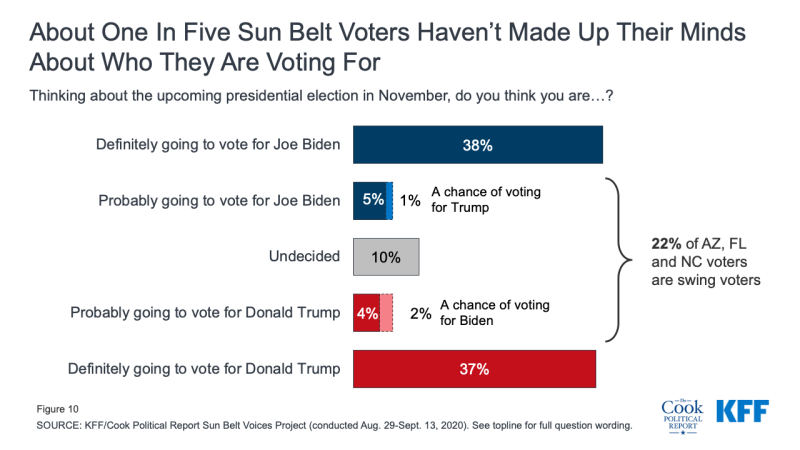
Figure 10: About One In Five Sun Belt Voters Haven’t Made Up Their Minds About Who They Are Voting For
On most demographics, swing voters look very similar to their counterparts (voters who say they have already decided who they are going to vote for in the 2020 election), but they differ on three key variables: age, party identification, and ideology. Swing voters generally are more likely to say they are moderate in terms of their ideology (61%) and a larger share identify as political independents (43%) than their decided counterparts (10%). In addition, swing voters are slightly younger as a whole with about six in ten under the age of 50. In addition, nearly one in four swing voters are Hispanic voters (22%) compared to 13% of decided voters.
While a similar share of swing voters say they are Democrats or Democratic-leaning independents (27%) as say they are Republicans or Republican-leaning independents (30%), their top issue for their vote choice is more like the priorities of Republicans than Democrats. Large shares of swing voters in each of the three states (AZ: 38%, FL: 37%, N.C.: 32%) say the economy is going to be the most important issue in deciding their vote for president while significantly fewer say the same about any other issue – including the coronavirus outbreak (AZ: 9%, FL: 13%, N.C.: 13%).
Job Approval
Throughout President Trump’s presidency, his overall net approval as remained largely stable except for a short dip over the summer – perhaps in response to his handling of the coronavirus outbreak. More recently, his overall job approval has been around 45% in national polling. President Trump has similar job approval among voters in these Sun Belt states – with one notable exception. Arizona voters are more disapproving than approving of the job Trump is doing as president, resulting in a negative net approval of – 8 percentage points.
Among the small share of voters who haven’t made up their minds about which candidate to vote for, these swing voters are divided on their views of both President Trump and former Vice President Biden with a slightly larger share saying they approve of Biden. Overall, about half of swing voters approve, which is about as many as disapprove, of both the job Donald Trump is doing as president (Approve: 45%; Disapprove: 54%) and of Joe Biden generally (Approve: 56%; Disapprove: 42%), with slight variations within states. To see the full percentages for job approval for both President Trump and Biden in each of the three states, see the Appendix Table 1.
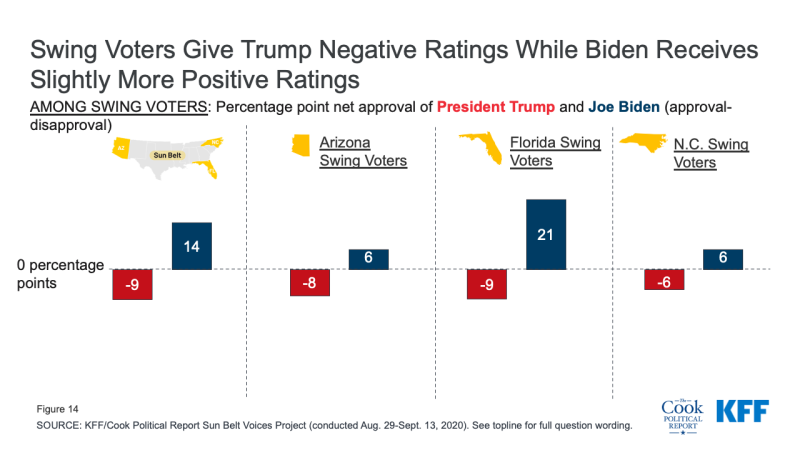
Figure 14: Swing Voters Give Trump Negative Ratings While Biden Receives Slightly More Positive Ratings
The connection between voters’ overall approval of both candidates and their ultimate choice in which candidate to vote for has been illustrated by others, especially in light of President Trump’s relatively stable overall job approval numbers throughout his presidency. Despite the twists and turns of the campaign and the various national issues that have captured voters’ attention, voters’ approval of the candidates continues to be one of the strongest predictors of vote choice. Our analysis of these Sun Belt states finds there is a small share of voters (5%) who say they “approve” of both former Vice President Biden and the job Donald Trump is doing as president (5% of voters in Arizona, 6% of voters in Florida, and 3% of voters in North Carolina). Overall, these voters tend to be less partisan, are more likely to identify as independents and moderates, and more than half are swing voters with 53% saying they are currently undecided about which candidate they plan to vote for while 9% say they are probably going to vote for President Trump and 7% say they are going vote for Biden.
Other Key races to Watch
In addition to the presidential election, there are other important Senate races in Arizona and North Carolina, a gubernatorial race in North Carolina, as well as congressional races throughout each of the three states. To see the views of voters across demographics within each state, check out our state interactives.
As of the second week of September, a larger share of voters in Arizona say they are voting for Mark Kelly, NASA astronaut than incumbent Sen. Martha McSally (44% compared to 36%).
In North Carolina, Democratic Governor Roy Cooper (48%) has a lead over Republican Lt Governor Dan Forrest (38%), while the Senate election between Republican incumbent Thom Tillis and Cal Cunningham is within the margin of error.
Trump Voters Report Higher Enthusiasm In Key Sun Belt States, Motivation To Turnout Is Equal Across Partisans
Three-fourths of voters (74%) who say they are voting for President Trump report being “very enthusiastic” about their vote with an additional one-fifth (19%) saying they are “somewhat enthusiastic.” Voters who say they are voting for Joe Biden report lower levels of enthusiasm with six in ten (58%) saying they are “very enthusiastic” with an additional 27% saying they are “somewhat enthusiastic.” One in seven Biden voters (15%) say they are either “not very enthusiastic” or “not at all enthusiastic” about voting for him compared to 6% of Trump voters who report the same.
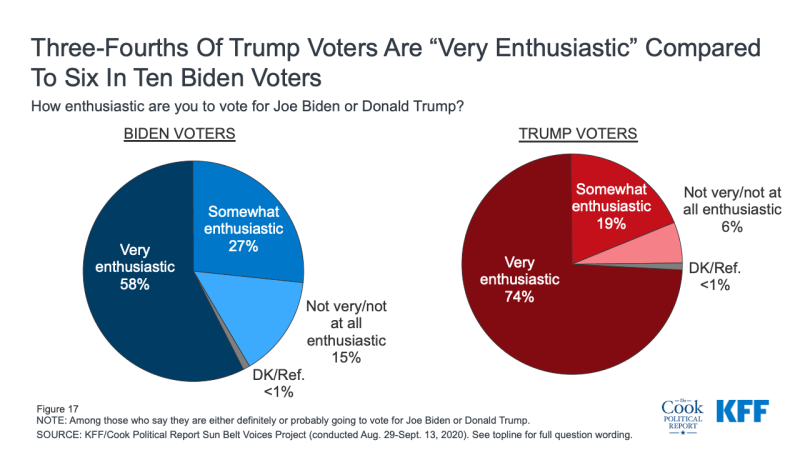
Figure 17: Three-Fourths Of Trump Voters Are “Very Enthusiastic” Compared To Six In Ten Biden Voters
Six in ten (61%) Biden voters say that his choice of Sen. Kamala Harris as his running mate makes them “more enthusiastic” about voting for him while one-third (34%) say “it does not make a difference.” Only 5% of Biden voters say the choice of Harris as the Vice President nominee makes them “less enthusiastic” about voting for the Democratic ticket.
President Trump’s voters have the enthusiasm advantage in each of the three Sun Belt states included in this poll with about three-fourths of Trump voters in Arizona (73%), Florida (74%), and North Carolina (75%) saying they are “very enthusiastic” to vote for him. Comparatively, about half of Biden voters in Arizona (53%) and about six in ten Biden voters in Florida (60%) and N.C. (57%) say they are “very enthusiastic” about their vote.
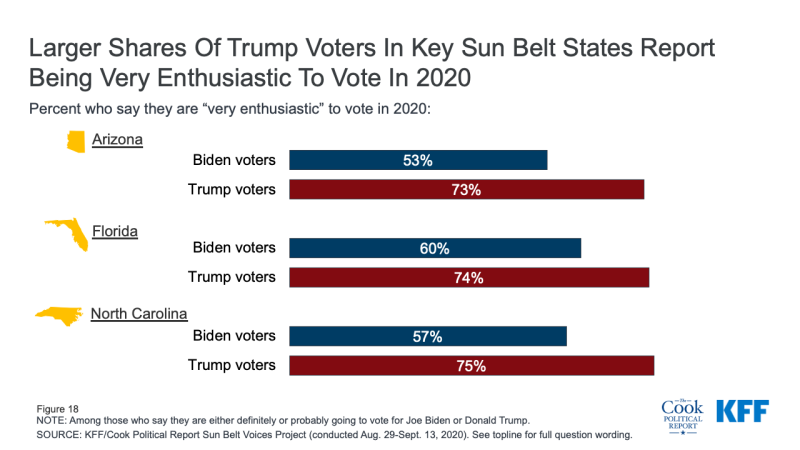
Figure 18: Larger Shares Of Trump Voters In Key Sun Belt States Report Being Very Enthusiastic To Vote In 2020
Last year’s Blue Wall Voices Project found that a larger share of Democratic voters saying they were “more motivated” to vote in the 2020 election compared to the 2016 election. The latest polling in these Sun Belt states finds that majorities of both Democratic and Republican voters say they are “more motivated” to vote in this year’s election.
| Table 3: Neither Party Has Advantage On Motivation | |||
| Percent who say they are more motivated to vote in the 2020 election than in the 2016 election: | Arizona | Florida | North Carolina |
| Total | 58% | 59% | 66% |
| Democratic voters | 64 | 63 | 71 |
| Independent voters | 50 | 55 | 63 |
| Republican voters | 65 | 67 | 71 |
Trump Is A Motivating Force For Voters
While Biden voters may not be as enthusiastic about their vote choice as Trump voters, this doesn’t mean that they aren’t motivated to vote. Instead, their motivation may be less for their vote choice, and more against President Trump.
Half of Biden voters (53%) in the Sun Belt states polled say their vote is mainly a vote “against Donald Trump” compared to 14% of Trump voters who say their vote is mainly one “against Joe Biden.” Nearly nine in ten (86%) Trump voters say their vote is mainly one “for Donald Trump.”
Biden voters who say their vote is mainly a vote “against Donald Trump” are younger and less partisan than their counterparts (those who say their vote is “for Joe Biden”).
Voters Still See Trump As The Unconventional Candidate
President Trump has long touted his unconventional leadership style and in 2016, he ran as the candidate who was going to deliver a shock to business as usual in Washington, D.C. Perhaps unsurprisingly, vast majorities of Democrats say they prefer Biden’s leadership style (96%) over President Trump’s (3%), while most Republicans say they prefer President Trump’s leadership style (92%). Independents in these three Sun Belt states slightly prefer Biden’s leadership style as do a majority of swing voters. Half of swing voters say regardless of who they intend to vote for, they prefer Joe Biden’s leadership style over President Trump’s. Four in ten (39%) swing voters say they prefer Trump’s leadership style while one in ten (11%) are unsure which style they prefer.
When given a list of characteristics that could describe President Trump, two-thirds of voters say unpredictable (68%) is a term that describes him while most voters say that being too old to be president (81%) and part of the Washington establishment (71%) are not terms to describe him. Most voters also say that cares about people like me is also not a description of President Trump (56%); however, 85% of Republican voters say this does describe him. Partisans are also divided on whether a strong leader is a good describer of President Trump with 92% of Republican voters saying it “does describe him” while 90% of Democratic voters and 53% of independent voters say it “does not describe him.”
Two-thirds of voters say unpredictable is a characteristic that describes President Trump but whether that is a “good thing” or a “bad thing” depends on partisanship. Four in ten Republican voters (41%) say President Trump is unpredictable but 27% of them say being unpredictable is a “good thing” while the vast majority of Democrats (86%) as well as most independent voters (58%) say that Donald Trump is unpredictable and this is a “bad thing.”
Majorities of voters say that being part of the Washington establishment describes Joe Biden (72%) but once again, whether that is a “good thing” or a “bad thing” depends on partisanship. Two-thirds of Democratic voters say being part of the establishment describes Joe Biden but most (53% of all Democratic voters) say Biden being part of the Washington establishment is a “good thing,” while most Republicans (66%) and half of independent voters (41%) say Biden is part of the establishment and this is a “bad thing.”
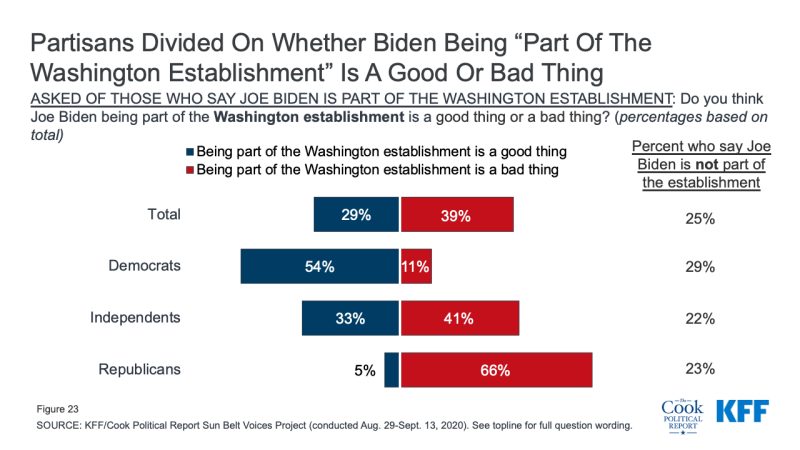
Figure 23: Partisans Divided On Whether Biden Being “Part Of The Washington Establishment” Is A Good Or Bad Thing
Seven in ten voters say being part of the Washington establishment describe Biden, about half of voters say cares about people like me (53%), very liberal (53%), and moderate (52%) describes Biden. Slightly more than half of voters say being too old to be president and strong leader do not describe Biden (53% and 55%, respectively).
Views of what characteristics describe and do not describe Biden and Trump fall largely along party lines with majorities of Democratic voters saying strong leader describes Biden and most Republican voters say the same about President Trump.
Swing voters, on the other hand, may have their voting decisions impacted by such messages. Most swing voters say that moderate is a term that describes Biden well, with most of them and nearly half of voters overall saying this is a “good thing” (AZ: 44%, FL: 49%, N.C.: 46%). In addition, six in ten swing voters in Florida and N.C. say cares about people like me is something that describes Biden well.
| Table 4: Swing Voters’ Views Of Biden | |||
| Percent of swing voters who say each of the following describes Joe Biden… | Arizona swing voters | Florida swing voters | N.C. swing voters |
| Too old to be president | 51% | 42% | 39% |
| Part of the Washington establishment | 69 | 70 | 62 |
| Is this a good thing? | 25 | 35 | 25 |
| Is this a bad thing? | 41 | 32 | 35 |
| Very liberal | 52 | 42 | 45 |
| Is this a good thing? | 17 | 15 | 16 |
| Is this a bad thing? | 34 | 26 | 29 |
| Moderate | 59 | 62 | 54 |
| Is this a good thing? | 44 | 49 | 46 |
| Is this a bad thing? | 13 | 11 | 7 |
| Cares about people like me | 46 | 61 | 57 |
| Strong leader | 38 | 38 | 42 |
A majority of swing voters in Arizona (59%), Florida (66%), and North Carolina (61%) say President Trump is unpredictable and this is a bad thing. Less than half of this share say President Trump cares about people like me and no more than half say that being a strong leader describes him well.
| Table 5: Swing Voters’ Views Of Trump | |||
| Percent of swing voters who say each of the following describes Donald Trump… | Arizona swing voters | Florida swing voters | N.C. swing voters |
| Too old to be president | 19% | 16% | 17% |
| Part of the Washington establishment | 25 | 28 | 26 |
| Is this a good thing? | 9 | 13 | 12 |
| Is this a bad thing? | 15 | 15 | 12 |
| Unpredictable | 74 | 82 | 81 |
| Is this a good thing? | 14 | 14 | 18 |
| Is this a bad thing? | 59 | 66 | 61 |
| Cares about people like me | 25 | 30 | 34 |
| Strong leader | 45 | 46 | 46 |

